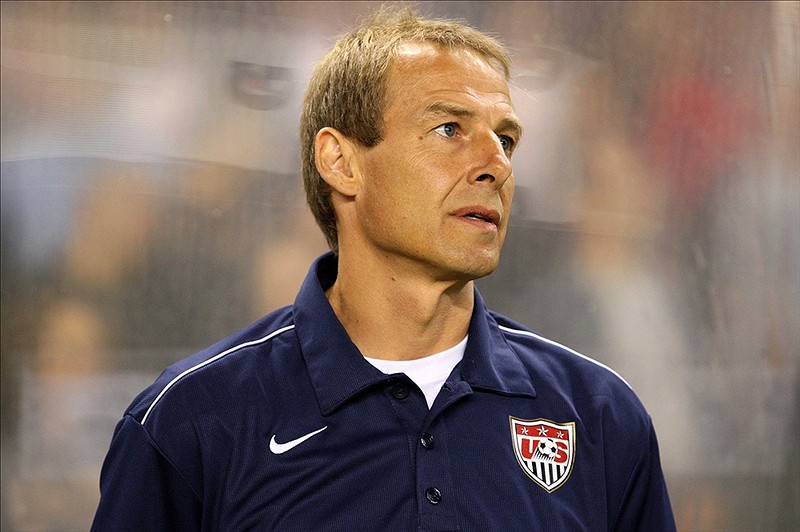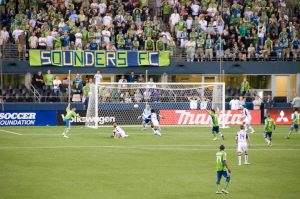On October 15, 2015, Major League Soccer commissioner Don Garber claimed that Jurgen Klinsmann, the United States men’s national team manager, made comments detrimental to the league when the former German star claimed that it was difficult to find high levels of play in the MLS, compared to top-flight European leagues. Just a week ago, the owner of the league’s Portland Timbers bashed Klinsmann, attacking him for apparently having an anti-MLS agenda.
Even players have problems with Klinsmann’s attitude towards MLS. Sporting Kansas City’s Benny Feilhaber thinks the player selection process is biased towards players in foreign leagues. I wrote an article earlier this year questioning why Klinsmann wouldn’t give the New England Revolution’s Lee Nguyen a chance to prove himself in a clear position of need for the national team. While criticizing USMNT stars Clint Dempsey and Michael Bradley’s moves from Europe to MLS, Klinsmann praised twenty year-old Matt Miazga’s recent transfer to Chelsea and seventeen year-old American prospect Christian Pulisic’s debut for German stalwart Borussia Dortmund. Klinsmann’s stance that the MLS has a ways to go to be a top soccer league is not outlandish among national team managers; Mexico head coach Juan Carlos Osorio was even more critical on MLS than Klinsmann.
Part of the problem is that Klinsmann is experiencing a conflict of interest; not only is he the USMNT’s head coach, but he also serves as the team’s technical director. As head coach, Klinsmann absolutely must push his players to the most competitive divisions to prepare them for national team games. However, part of his duty as technical director is to work with the MLS on player development and the management of youth academies. These roles that Klinsmann is expected to play create an awkward situation; his job as head coach is to make the national team as competitive as possible right now, but his duty as technical director is to assist in the long-term growth and development of the USMNT, which includes building MLS into a better league. These two efforts are often in opposition to each other, as Klinsmann has shown the propensity to urge young, talented American players abroad, which angers MLS organizations. Current players, owners, and experts believe that keeping young players in the MLS is vital to its long-term growth into a more competitive league rivaling the top divisions in Europe. The league understandably wants talented players in their youth systems to remain in the states.
That’s why this is such a complication for Jurgen. If he thinks his young prospects are good enough for European divisions, he has to urge them to play in the best leagues. However, it’s also clear that keeping some of these players in MLS is vital to the league’s growth into a more potent soccer division. He has to figure out a way to mix these two duties; keeping MLS owners happy and growing the league’s player development capabilities are obviously extremely important, but getting his young players prime competition in the best leagues in the world is also vital.
Even though Klinsmann is in an understandable predicament, the head coach of a national team having the commissioner and owners of his home league publicly attacking him is not a good look. The Timbers’ owner also said: “I don’t think you’re going to find a single MLS owner who’s going to be an advocate for Jurgen Klinsmann.” That is really bad, and it seems as though Klinsmann has a way to go to come close to mending his relationship with the home league.
I still don’t see all the “anti-MLS” sentiment he is being accused of holding, though. Klinsmann is often quoted saying he wants younger American players to compete in Europe. Is that a bad thing? As argued by some friends here at Halftime earlier this year, MLS is indisputably on the rise. The combination of former European stars (Kaka, Andrea Pirlo, Frank Lampard, Steven Gerrard, Ashley Cole), younger foreign talents (Sebastian Giovinco, Giovani Dos Santos), and veteran American nationals (Michael Bradley, Clint Dempsey, Mix Diskerud) has made MLS as competitive as ever. However, even with this augmented talent, MLS is still incomparable to the top Spanish, German, English, Italian, and French leagues. If a young player wants to go pro, from an academy or college, shouldn’t his head coach push him in the most competitive direction and urge him to play at the highest level possible? If the player is good enough to play in Europe, why push them to MLS, a less competitive league?
If Klinsmann is to manage the United States for the remainder of his contract (through the 2018 World Cup), he certainly has some bridges to rebuild with MLS. Player development in the home country is imperative to field a competitive national team, and the United States will be no exception. If Klinsmann and MLS settle their differences and become friends rather than enemies, both parties would be in much better positions.






